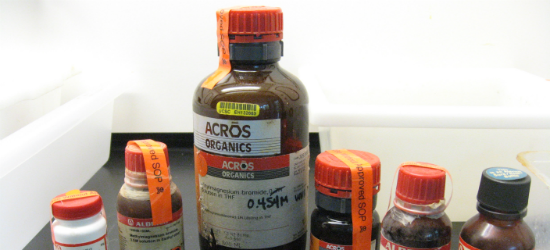Standard Operating Procedures
***** SOP Template - Click Here *****
Operations Requiring Prior Approval
Prior approval must be obtained from the Principal Investigator for designated activities that present specific, foreseeable hazards to researchers. Review the information below regarding chemicals that require an approved Standard Operating Procedure. Researchers must be trained in the safe use of designated chemicals prior to beginning research activities with them. Other general considerations regarding operations requiring prior approval:
- Unattended Operations - Procedures carried out continuously or overnight must be planned carefully to avoid hazards and mishaps such as utility failure or cooling water disruption or floods. Arrangements for routine checks and notification to all members of the lab group should be made. Appropriate warning signs must be posted in the area or on the equipment.
- Working Alone - Do not conduct high hazard work in the laboratory while alone. When performing low hazard activities, make arrangements with other individuals in a nearby lab to check in periodically.
The following sections provide useful information for the SOP development process:
Standard Operating Procedures (SOPs)
Note that the Resources section provides specific information on developing SOPs for pyrophoric materials, including training information and SOP templates.
Requirements and Resources for Work with Pyrophoric Materials
Standard Operating Procedures (SOPs)
Standard operating procedures (SOPs) incorporating safety and health considerations must be developed and followed when laboratory work involves the use of hazardous chemicals, especially “particularly hazardous substances.” SOPs are written instructions that detail the steps to be performed during a given experimental procedure and include information about potential hazards and how these hazards will be mitigated. SOPs should be written by laboratory personnel who are most knowledgeable and involved with the experimental process.
Consider the following information when developing an SOP:
- Type, quantity, and nature of the chemical used. Note that the Safety Data Sheet (SDS) lists important information regarding potential hazards that will need to be considered, such as toxicity, flammability, reactivity, warning properties, and symptoms of exposure.
- Location of use, including fume hood or other containment devices. Include specifically-designated work area for "particularly hazardous substances."
- Process details.
- Available safety equipment, including personal protective equipment.
- Waste collection, storage, and disposal requirements.
- Decontamination procedures.
If a new chemical will be produced during the experiment, an SDS may not be available. Every effort should be made to evaluate potential hazards based on analogy to similar compounds or expected structural features of the chemical. When the potential toxicity is unknown, it must be assumed that the substance is "particularly hazardous."
Circumstances requiring prior approval from the PI/Laboratory Supervisor must be addressed in laboratory-specific SOPs. These circumstances are based on the inherent hazards of the material being used, the hazards associated with the experimental process, the experience level of the worker, and the scale of the experiment. Some examples of circumstances that may require prior approval include working alone in a laboratory, unattended or overnight operations, the use of highly toxic gas of any amount, the use of large quantities of toxic or corrosive gases, the use of extremely reactive chemicals (e.g., pyrophorics, water reactive chemicals), or the use of carcinogens.
Documentation
Submit SOPs to EH&S for review and documentation. For certain hazardous chemicals or specialized practices, consideration must be given to whether additional consultation with safety professionals is warranted or required.
EH&S stores electronic copies of SOPs on a secure web site. Each lab group should also store copies of their signed SOPs either electronically or as readily-available printed documents.
SOP-Specific Training
All researchers using a specified chemical or process must be trained on the relevant SOP, and this training must be recorded. Training can be documented by completing the signature page at the end of the SOP. SOPs must be available to all laboratory personnel.
Resources
- UCSC Process-Specific SOP Template: SOP template based on process description, followed by chemical-specific information
- Template SOP Request Form
- UC List of Chemicals Requiring SOPs: Core list of chemicals for which SOPs are required under the 2012 UC Regents Lab Safety Settlement Agreement
- GHS "H Codes" for Particularly Hazardous Substances Requiring SOPs: Use of any chemical with any of these H codes requires an SOP. These codes can be found on the Safety Data Sheet for the chemical.
- UC SDS (Safety Data Sheet) and Information System - The UC Safety system includes a Safety Data Sheet (SDS) search function, as well as links to chemical health and safety information.
- Organic Syntheses Website: Information on organic chemical synthesis reactions
- Schlenk Line Survival Guide - A visual guide for safely setting up and operating a Schlenk line.

